June 17, 2025 | 03:50 GMT +7
June 17, 2025 | 03:50 GMT +7
Hotline: 0913.378.918
June 17, 2025 | 03:50 GMT +7
Hotline: 0913.378.918
The Department of Plant Protection said that on August 12th, the Bangkok Post published that China had issued an indefinite ban on Thai longan exports to this country because of mealybug infection.
The Bangkok Post quoted a source from the Department of International Trade Promotion (Ministry of Commerce of Thailand) stating that the ban will start from August 13, 2021.
The reason for the ban was that mealybugs were detected in Thai longan exports to China. The Department of International Trade Promotion of Thailand also said it had directed the commercial attache in China to find a way to postpone the ban, because the it was issued and applied too suddenly.
If negotiations fail, Thailand's longan exports will be severely affected as 70-80% of Thailand's longan exports go to the Chinese market.
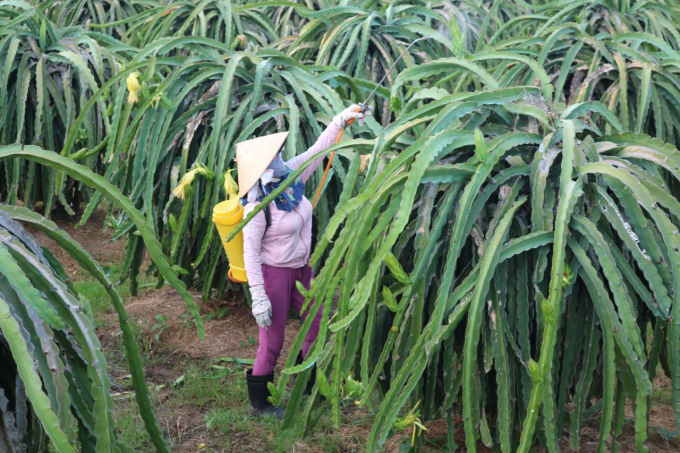
The Plant Protection Department proposes to strengthen the inspection and close monitor of organisms harmful to fruit trees in the planting areas. Photo: KS.
With this motion by China, on August 16th, the Plant Protection Department (Ministry of Agriculture and Rural Development) said that it has asked localities as well as the the plant protection and quarantine industry in Vietnam to reinforce measures ensuring that Vietnamese fruit shipments exported to the Chinese market (especially longan, dragon fruit) are not infected with pests, especially mealybugs in order to maintain our fruit exports to the Chinese market.
Mr. Hoang Trung, Director of the Plant Protection Department said: Mealybugs are very common pests in our country, not only for key fruit trees such as longan, dragon fruit, citrus... but also on other crops.
Therefore, if there is no strict inspection and control at the planting areas, as well as strict measures for phytosanitary activities, it is very likely for plants to be infected with this pest. Fruit shipments for export, especially key fruits, are currently in the full harvest season and exported to the Chinese market such as longan, dragon fruit, etc.
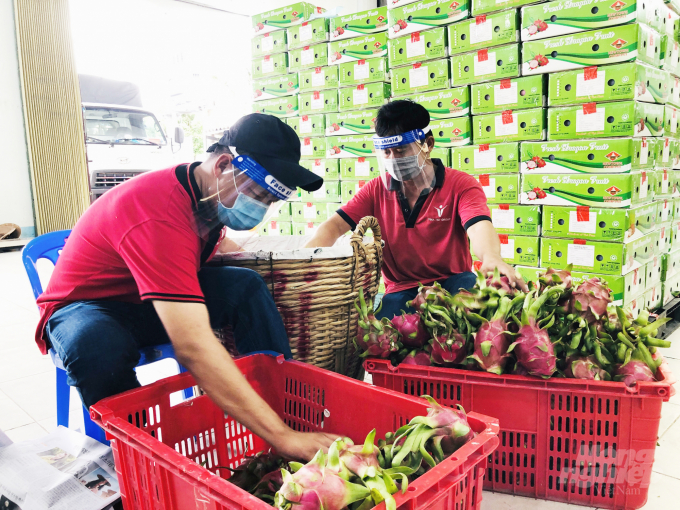
Department of Plant Protection recommends that export enterprises closely inspect for harmful organisms on export fruit batches, especially mealybugs. Photo: TL.
Accordingly, the Department of Plant Protection proposed localities to direct the plant protection industry to strengthen the management and monitor of planting areas, especially fruit-growing areas that have registered for export to the Chinese market.
For registered planting areas with a high risk of pest infection, especially mealybugs, it is necessary to closely review and inspect the pests subject to China's quarantine (especially with mealybugs and fruit flies). Planting areas with high risk of pest infestation should proactively suspend fruit exports to the Chinese market.
The Department of Plant Protection recommends that production units and enterprises that prepare, pack and export fruits to the Chinese market must pay special attention and closely coordinate with plant protection and quarantine agencies to comply with regulations in production organization, management, monitoring and control of pests and diseases (especially mealybugs); strictly comply with phytosanitary measures and procedures for fruit shipments exported to the Chinese market.
The Department of Plant Protection said that it will direct the specialized plant quarantine system to tighten export phytosanitary measures for fruit shipments exported to the Chinese market in the near future from growing areas to packaging facilities, enterprises before export as well as quarantine at border gates…
The Department of Plant Protection also said that recently, the plant quarantine agency at the border gate still detects harmful bugs that are subject to China's plant quarantine on fresh fruits Vietnam exporting to China such as rambutan, banana, mango, dragon fruit, jackfruit, longan.
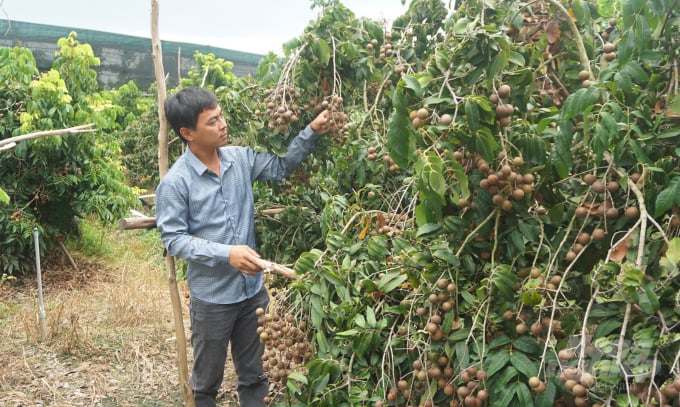
Longan also requires special attention to prevent mealybugs right from the garden. Photo: TL.
Regarding long-term and regular solutions, the Department of Plant Protection recommends that localities and the plant protection industry must regularly inspect and monitor gardens to detect bugs, promote the application of integrated pest management program (IPM) to manage bugs and other harmful organisms on export orchards.
Only use pesticides to exterminate bugs when absolutely necessary and when used, make sure to adhere to the "4 right" principle.
Regarding quarantine measures, it is necessary to carefully inspect exported fruits at the preliminary processing and packaging stage. Remove fruit, fruit bunches with harmful bugs to not include them in export batches. In case of fruits such as jackfruit, dragon fruit, and bananas, a method of removing bugs on fruits after harvest can be applied by washing them with water, combined with a high-pressure steam nozzle to blow away any remaining bugs sticking to the fruits. Strict inspection and quarantine of export batches of fresh fruit is required to ensure compliance with the regulations of the importing country…
Mealybugs are insects of the family of Coccidae, Diaspididae and Pseudococcidae that damage many perennial crops such as fruit trees and industrial plants.
In production, farmers often understand mealybugs as waxy mealybugs. Adult mealybugs (Coccidae) usually have a waxy outer covering, scaly mealybugs (Diaspididae) are often shaped like snail scales, and waxy mealybugs (Pseudococcidae) are oval shaped and covered with waxy chalk.
The adult mealybugs often fixate in one place, sucking sap, fruit and laying eggs just below the abdomen, it can reproduce quickly, having 6-7 generations a year.
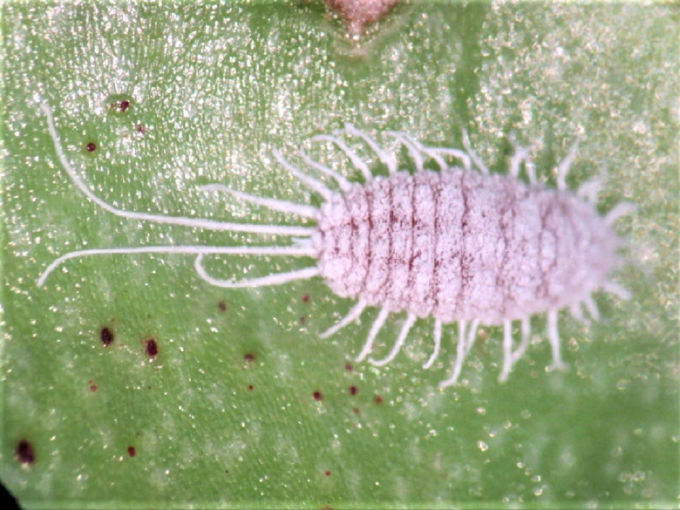
Close-up of waxy mealybugs (Pseudococcidae). Source: Plant Protection Department.
As for pests infecting plant parts on the ground, they often cling to the back of leaves, twigs, young branches, stalks of flower clusters, fruits, etc. to suck up sap, turning leaves yellow, rough, withered, young bud may wilt, small branches, flowers fall prematurely, fruit unable to develop and fall.
For pests that damage plant parts below the ground, mealybugs burrow into the ground to suck up fluids at the base of the stem and root neck. When the roots are severely damaged, the tree becomes barren, leaves turn yellow, then gradually wither and die because the roots are destroyed, unable to absorb water and nutrients to nourish the plant.
When mealybugs damage the roots for a prolong time, they symbiotically combine with fungi in the soil to form large areas of rough, gray-white surface surrounding the root segments (often called "bamboo shoots" by farmers), inside are various mealybugs clinging to the root surface that has peeled off suck nutrients. Nematodes, pathogenic fungi also follow the wounds created by mealybugs to invade, causing more serious harm.
Mealybugs are often spread by ants, wastes by mealybugs are food for ants that live symbiotically on trees. Ants eat the secretions from mealybugs, while letting the mealybugs burrow into the ground and mealybugs continue to suck at the base of trees and plant roots.
Mealybugs are also spread by rainwater, irrigation water or gardening tools. In newly planted gardens, mealybugs arise mainly from the fruiting stage, initially appearing in some trees and then gradually spreading to surrounding trees.
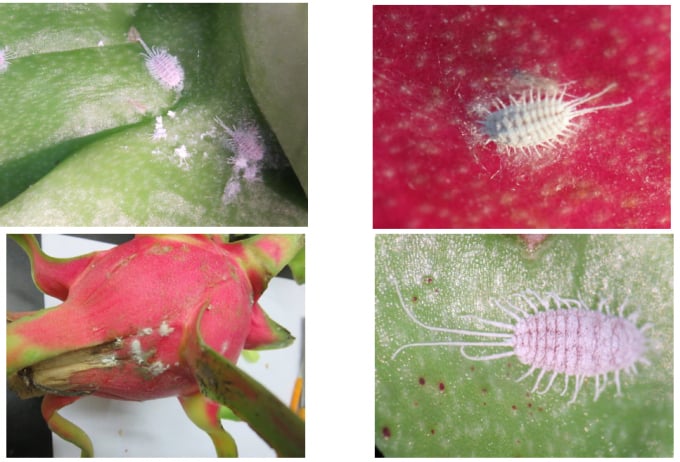
Pictures of mealybugs damaging dragon fruit trees. Source: Plant Protection Department.
To prevent mealybugs, people need to implement integrated management (IPM) measures as follows:
Cultivation measures: Regularly check the garden to detect the appearance of mealybugs early, remove them by cutting off branches and destroying fruit affected by mealybugs.
Prune diseased branches, old branches, and dead branches lying in the foliage to keep the garden clear. Check and clean gardening tools to limit the spread of mealybugs from one garden to another, from one tree to another.
Regularly clean up grass, rotten leaves around the base to destroy the habitats of mealybugs. Using a pump to spray water on places to wash where many mealybugs are attached, and at the same time create moisture on the tree to reduce the number of mealybugs.
Biological measures: Protecting natural enemies of mealybugs such as parasitic wasps, predators that eat ladybugs, weaver ants, pintail beetles...
Chemical measures: Using drugs on the list of pesticides permitted for use in Vietnam to get rid of mealybugs according to the four-right principle. Spray only where mealybugs are present.
Translated by Nguyen Hai Long

(VAN) The working delegation from the Ministry of Agriculture and Environment conducted an important trip to the Netherlands to strengthen strategic partnerships and sustainable development in the agricultural sector.

(VAN) The letter ‘A Plea from the Ocean’ not only evokes emotion but also awakens the human conscience to the responsibility of protecting life on Earth.

(VAN) The Department of Agriculture in South Africa has announced the country’s first mass vaccination of poultry to prevent local birds from contracting avian influenza.

(VAN) Establishment of the Mekong Delta Regional Agricultural Linkage Center, aiming for a closed value chain, deep processing, trading platforms, and international market connectivity.

(VAN) Gia Lai province has recently recorded 460 rare species of animals and plants, contributing to forest conservation and biodiversity planning in the region.

(VAN) Ms. Caroline Beresford, New Zealand Ambassador to Vietnam, expressed confidence that agricultural cooperation between Vietnam and New Zealand will develop sustainably, be climate-resilient, and promote gender equality.

(VAN) Vietnam reaffirms its commitment to international cooperation in fostering sustainable and responsible fisheries while ensuring resilient livelihoods for small-scale fishing communities.